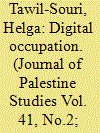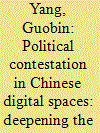|
|
|
Sort Order |
|
|
|
Items / Page
|
|
|
|
|
|
|
| Srl | Item |
| 1 |
ID:
111231


|
|
|
|
|
| Publication |
2012.
|
| Summary/Abstract |
In disengaging from the Gaza Strip in 2005, Israel did not end the occupation but technologized it through purportedly "frictionless" hightechnology mechanisms. The telecommunications sector was turned over to the Palestinian Authority under Oslo II and subcontracted to Palestine Telecommunications Company (PALTEL), furthering a neoliberal economic agenda that privately "enclosed" digital space. Coming on top of Israel's ongoing limitations on Palestinian land-lines, cellular, and Internet infrastructures, the result is a "digital occupation" of Gaza characterized by increasing privatization, surveillance, and control. While deepening Palestinian economic reliance on Israel and making Palestinian high-tech firms into dependent agents, digital occupation also enhances Israel's territorial containment of the Strip.
|
|
|
|
|
|
|
|
|
|
|
|
|
|
|
|
| 2 |
ID:
133727


|
|
|
|
|
| Publication |
2014.
|
| Summary/Abstract |
Although research on the Chinese Internet is thriving, our understanding of its multidimensional character, its diverse forms, actors, and dynamics remains limited. This is due to a tendency to focus on technology at the expense of meaning and people, as well as a bias towards sweeping and dichotomous analytical categories, such as state vs. netizens, politics vs. entertainment, and authoritarianism vs. democracy. One of the perniciously appealing ways of sensationalizing the Chinese Internet falls under this either/or dichotomy. The seven contributions in this special issue of China Information challenge such binaries, thus deepening the critical inquiry into the multiple dimensions of the Chinese Internet. The authors show a more complex and nuanced picture of actors and contestation in Chinese digital spaces, as well as the symbolic forms and consequences of these contestations, illuminating new meanings of the political and new dimensions of digital contestation, including race, class and their interactions with the nation. Together, these articles exemplify an analytical orientation that I refer to as 'deep Internet studies'. They explore the Internet as a facet of a deep China by linking it to people's practical, perceptual, and moral experiences as well as to the contexts of institutions, politics, and policies.
|
|
|
|
|
|
|
|
|
|
|
|
|
|
|
|
| 3 |
ID:
165144


|
|
|
|
|
| Summary/Abstract |
Since the end of the East–West divide in the 1990s, the world has slowly lost its US-based unipolarity to globalisation, and a shift towards East Asia. This phenomenon has given more space to middle powers and furthered the embeddedness of the political, economic, and cultural spheres into the dynamics of social structures. It is highly visible when observed from the digital communication standpoint, which has become pervasive. In this context, the study of international power has moved towards the concept of soft power, which remains a fuzzy concept concerning ‘who’ and ‘what’. We define power as a continuum, in which various types of public and private actors carry out different types of coercive to cooptive actions in various but embedded spheres. We propose an empirically tractable conceptual framework that we use as a tool to analyse soft power within a hard-to-soft power spectrum, in which the articulation, dynamics and incremental nature of soft power become observable. We illustrate our point with the case study of South Korean power in Indonesia in the twenty-first century and draw conceptual as well as practical conclusions.
|
|
|
|
|
|
|
|
|
|
|
|
|
|
|
|
|
|
|
|
|